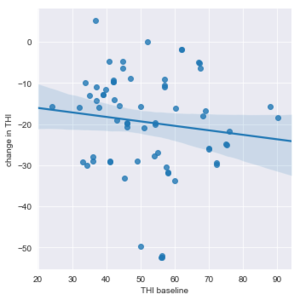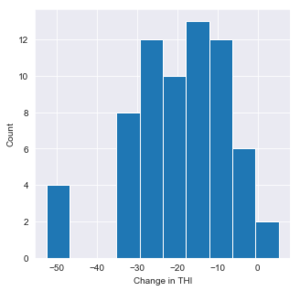4000 euro is absurd. And I'll tell you why.
I've looked at the data for TENT-A2, arm 1. These are the most impressive results so far. For the people who were able to look at Humbert Lim's presentation: right graph, slide 26.
I digitized the data points and looked at the effect of the device as a function of the baseline THI. In other words, I wanted to know how much improvement in THI can one expect for a given baseline THI.
The result (see graph below) is that the effect in terms of THI points is about constant. Irrespective of the THI score at the start of the trial, people on average reported a decrease in THI of nearly 20 points. That's not nothing! But it's especially good news for those with mild tinnitus. For example, someone with a score of 30 can expect a 60% drop in his/her score yielding a score of 10, which is probably clinically significant. On the other end of the scale, someone with a score of 90 ends up with a score of 70 (a 20% drop). In fact, two people with a THI of about 90 ended up with a score of 80 in the trial (10% drop). That's still very invasive tinnitus.
The bottom line is that the relative effect of Lenire seems to be more significant for milder tinnitus. Or differently: the people craving this the most will derive relatively the least relief. The more desperate you are for the device, the less relative effect it will have for you - that's what *their* data tells me.
On top of that: notice the huge spread in the data. I've added a histogram of the effect sizes. Yes, there are people with a 50 point decrease in THI. But there are more people with 0-10 points decrease. In their data, 40% of people had a decrease in THI less than 15 points.
To me, these results seem not a good base to go and charge people 4000 euro. Especially if those people are the most desperate among us. I don't want to discourage people, but I think it best to look at the data and try to be objective and evaluate the expected results before forking over 4000 euro.
And I think this cautioning message should come from Neuromod and not someone on a forum.
P.S. I'll be happy to look more at the data if people think this is helpful.
View attachment 29793
View attachment 29792

 Member
Member

